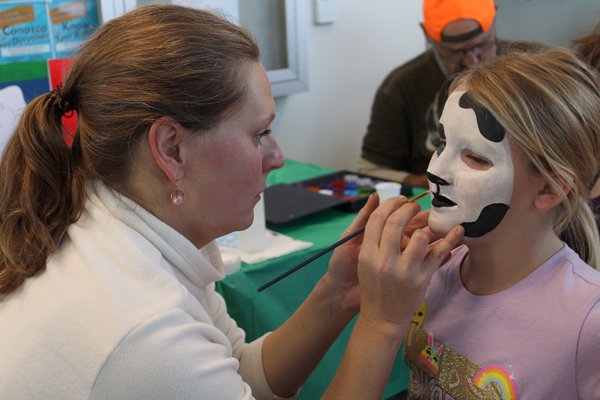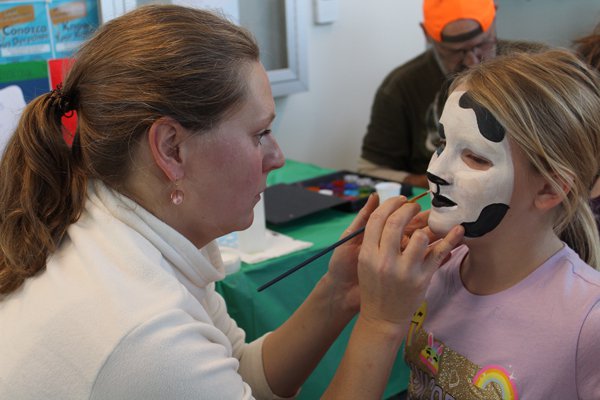MONROE — Within the year-old Green County Public Health and Human Services building sits an even newer addition: “Mental Health Matters.” The purpose is simple: offer first-step mental healthcare resources for an underserved county, all in one place, and provide assistance navigating those resources.
Mental Health Matters is not case management or therapy, but rather a starting point for Green County residents to easily see what options are available to them. And it’s free.
It’s the first program of its kind in the state, and on Oct. 8 it celebrated its grand opening amid Mental Health Awareness Week, hosted by the National Alliance on Mental Illness-Green County.
People of all ages could stop at different stations throughout the lobby to make a stress ball, have their face painted and more. A free hot dog or brat dinner and assorted desserts were provided.
Staff were on hand to answer questions on what Mental Health Matters was all about. There was also a lot of information for visitors to peruse, about the program and beyond. That included Jacob’s SWAG, a local suicide prevention and awareness non-profit founded by Kurt and Teri Ellefson in honor of their son Jacob, who they lost to suicide in 2012.
Kurt Ellefson was enthusiastic about Mental Health Matters.


“Having a resource room like that is imperative to the citizens of Green County and their mental health,” he said.
Rob Miles, mental health supervisor for Green County Human Services, said they were optimistic about the program’s prospects for the community.
“We hope that it will bridge the gap between formal and informal services,” he said.
One way to measure how well a community’s mental health needs are being met is to find out how many residents there are per mental health provider. According to 2018’s County Health Rankings, Dane County has 260 residents per provider, compared to Wisconsin’s state average of 530.
In Green County, however, there are 1,080 residents per mental health provider. Other southwestern Wisconsin counties are similarly situated, ranging from Lafayette County’s just-above-state-average 560 to Iowa County’s 1,480.


“One of the ways we’re trying to meet that shortage [is] by navigating the resources we do have,” said Maria Johnson, who serves as one of two Mental Health Matters “navigators” along with Ashlee Glowacki.
Both women are Green County employees — Glowacki as a therapist with Comprehensive Community Services and Johnson in Adult Protective Services in the Aging and Disability Resource Center — but their involvement with Mental Health Matters is a separate project.
It so happened that as Mental Health Matters developed, Glowacki and Johnson were each working on their master’s degree in social work. Their current role as navigators is an internship and each day at least one of them will staff the room on their lunch hour for walk-ins.
Otherwise, people are invited to schedule an appointment any time from 8 a.m. to 4:30 p.m. Monday through Friday. And even without an appointment, and with or without staff present, Mental Health Matters will be open during those hours for visitors to sit, learn and explore, whether for themselves or to research assistance for a loved one.


The room is crispy decorated in green, blue and tan and features a soothing tabletop fountain, a coffee machine, and a ready privacy screen for sensitive conversations. A television display rotates through inspirational and informational items. Mental health providers will create one-page Power Points to be part of that cycle.
The space is filled with brochures on care providers, topics like depression and sexual assault, as well as on adjacent issues that might be barriers to care, like transportation.
“We also have resource books for both kiddos and adults,” said Glowacki. Subjects covered might include resilience, mindfulness and coping skills, Johnson said.
Part of their internship is “proving that this is a need,” Glowacki said, so that a Mental Health Matters navigator can become a permanent position, at least part-time. And it’s hoped that the resource navigation concept will spread.
“Mental illness is quite common, and treatable, just like any other condition,” Miles said.





